British criminal Eddie Chapman promised to work for the Nazis to escape prison, but later became a double agent and helped London deceive Berlin.
Eddie Chapman was born on November 16, 1914, in Durham, England, into a military family. He joined the army at the age of 17, but after only nine months of service and duty at the Tower of London, he ran away with a woman to Soho.
The army captured and imprisoned Chapman. After his release, Chapman returned to Soho, where he took up odd jobs. There, he became addicted to gambling, frequently ran afoul of the law, and eventually formed his own criminal organization, the "Jelly Gang".
In 1939, after a series of robberies across England that left him wanted, Chapman fled to the island of Jersey, a British territory in the Channel Islands, a few miles off the coast of France, hoping to hide and continue his criminal career.
But the Jersey police were not as clueless as Chapman thought. Not long after, plainclothes detectives found him having dinner with his girlfriend in a hotel. Chapman tried to escape through a dining room window but failed and was sentenced to two years in prison. The sentence was later extended after Chapman stole clothes from a fellow inmate and attempted to escape.
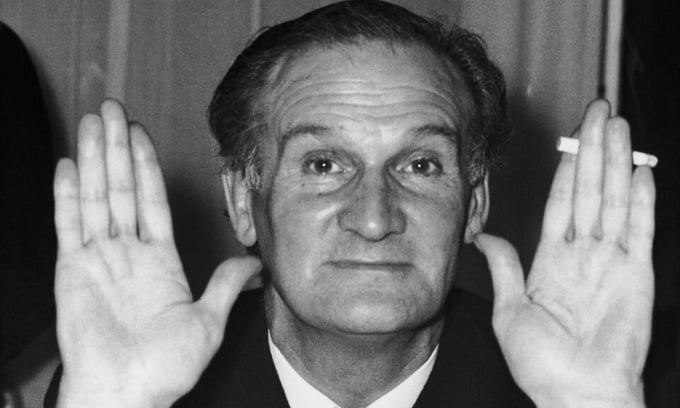
Eddie Chapman in 1967. Photo: Telegraph
In the summer of 1940, Nazi Germany invaded the Channel Islands, making them the only British overseas territory occupied by the Axis powers, consisting of Germany, Italy and Japan, during World War II.
With little hope of escape or continuing his criminal "career," Chapman made a decision that would change his life forever: Join German intelligence as a spy.
Chapman and another criminal named Anthony Faramus, a hairdresser, wrote a letter to the German commandant on the island. They bragged about their criminal prowess and linguistic skills, offering to spy for the Nazis to sabotage the British internal affairs.
At first, no one seemed to pay much attention to the letter. But one night, Chapman and Faramus were awakened by Gestapo officers, who put them on a boat bound for France.
Their letter was not ignored. German intelligence Captain Stephan von Groning saw great potential in Chapman and decided to train the British criminal. Meanwhile, Faramus was sent to the Buchenwald concentration camp and forgotten, but survived the end of World War II.
Throughout 1942, the Nazis trained Chapman in explosives, radio communications, and parachute jumping. Chapman quickly became fluent in French and German. By the end of the year, he had become von Groening's proudest pupil and the envy of every German spy in Europe.
Since 1940, the British de Havilland Mosquito bombers had been causing the Luftwaffe headaches by successfully destroying a series of prominent targets. This angered Field Marshal Hermann Goring, the head of the Luftwaffe. To appease Goring and gain an advantage in the air war, von Groning planned to send Chapman to England to blow up the de Havilland Mosquito factory.
In December 1942, Chapman landed in a muddy field in Cambridgeshire and did what no one in British or German intelligence expected: He surrendered.
Chapman never actually intended to carry out a mission for the Nazis. MI5, the British intelligence and counterintelligence agency, questioned Chapman for days before deciding that he could be a trustworthy "asset". MI5 determined that Chapman "hated Nazi Germany".
Codenamed "Agent Zigzag", Chapman was quickly brought into the Double-Cross System, an attempt to control the entire German spy network in Britain through secret double agents.
From the moment he began working for MI5, Chapman proved to his new superiors that they had been right to choose him. Chapman was eager to sabotage Nazi intelligence operations in Britain and abroad, starting with misleading them into believing that the de Havilland factory had been destroyed.
British agents made the factory look like it had been destroyed and released fake news reports to make the Nazis believe it. When reconnaissance planes brought back photos of the damaged factory, the Nazis were even more assured that the mission had been accomplished.
Chapman's handlers at MI5 wanted to make the most of this victory and arranged for him to be sent back to von Groning on the merchant ship The City of Lancaster to Lisbon, Portugal, a neutral country during World War II. Unknown to the Germans, they assumed that Chapman had found his own way back.
When he contacted the Germans at the German embassy in Lisbon, Chapman proposed that he blow up the City of Lancaster with a bomb disguised as a lump of coal. In fact, the British asked Chapman to find a way to get them the German bomb for study.
The Nazis gave Chapman two bombs, which he handed over to the ship's captain. To avoid suspicion, London announced that the ship had been damaged on its return journey to England and pretended to open an investigation.
For his exploits, Eddie Chapman was so highly regarded that the Abwehr, the Nazi military intelligence agency, sent him to Nazi-occupied Norway to train the next generation of spies. Chapman was awarded the Iron Cross, 110,000 Reichsmarks ($343,000 in today's money), and a yacht, but he remained loyal to Britain.
"The Germans loved Chapman, but he did not reciprocate. Chapman loved himself, he loved adventure, he loved his country," an MI5 officer wrote in his assessment. While in Oslo, Chapman also secretly took pictures of German agents to send information to the British.
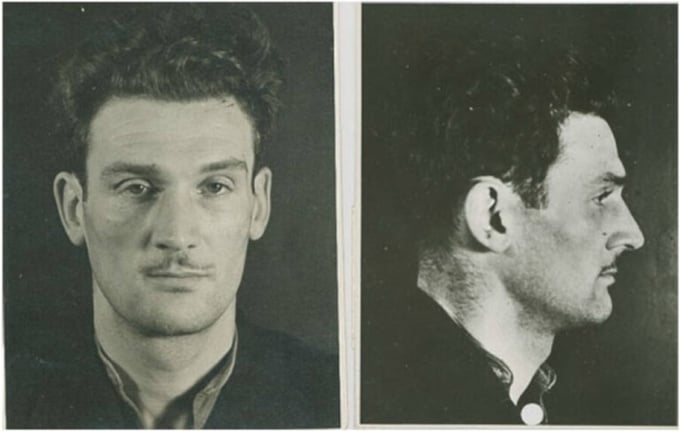
Eddie Chapman as a young criminal. Photo: Wikimedia Commons
In June 1944, Chapman returned to England to report on the accuracy of the German V-1 flying bombs (the precursors to the cruise missile) that were being dropped on Britain. Chapman gave the Germans false information that the bombs had hit targets in central London. As a result, the Germans did not adjust their attacks, and most of the bombs fell on the southern suburbs of London or the Kent countryside, causing far less damage than the Germans had expected.
On July 20, 1944, while Chapman was still in England, an unsuccessful assassination attempt was made on Nazi leader Adolf Hitler. Furious, Hitler disbanded the Abwehr. Chapman suddenly became a masterless spy in Germany.
Despite Chapman's numerous successes, MI5 eventually considered him a liability because he continued to associate with British criminals. Chapman was dismissed from the force on November 28, 1944, and ordered to keep his espionage activities secret.
Leaving MI5 provided Chapman with the perfect opportunity to return to crime. Britain at the time was a haven for criminals, with plenty of opportunities for black market dealing, theft, and forgery. Chapman became involved with blackmail and theft, and was involved in a number of crimes, including smuggling gold across the Mediterranean in 1950.
But the criminal who became Agent Zigzag had an unwritten privilege of immunity. Having carried out some of the most daring spy missions during World War II, the British government would never risk letting him fall into the hands of any police officer or reporter who might pressure Chapman into revealing secrets.
However, it was only a matter of time before the secret of Agent Zigzag and the Double Cross System was revealed. Chapman broke his oath and published his memoirs in France. He was fined by the British, but not by a large amount.
The rest of Chapman's life was relatively quiet. He married Betty Farmer, the girlfriend Chapman had abandoned on Jersey, and had a daughter. He became an entrepreneur and antique dealer in later years. Chapman died of heart failure at the age of 83 on December 11, 1977.
Remarkably, 29 years after the end of World War II, Chapman reconnected with von Groning, his former boss in German intelligence. Von Groning had been briefly imprisoned by the Americans and had since gone into hiding. Chapman invited von Groning to his daughter's wedding.
Vu Hoang (According to ATI )
Source link



![[Photo] Prime Minister Pham Minh Chinh attends the groundbreaking ceremony of the Tu Lien Bridge construction investment project](https://vphoto.vietnam.vn/thumb/1200x675/vietnam/resource/IMAGE/2025/5/19/d4a14c8f00214e42893e7760b91df468)


![[Photo] Special flag-raising ceremony to celebrate the 135th birthday of President Ho Chi Minh](https://vphoto.vietnam.vn/thumb/1200x675/vietnam/resource/IMAGE/2025/5/19/1c5ec80249cc4ef3a5226e366e7e58f1)
![[Photo] Party and State leaders visit President Ho Chi Minh's Mausoleum](https://vphoto.vietnam.vn/thumb/1200x675/vietnam/resource/IMAGE/2025/5/19/d7e02f242af84752902b22a7208674ac)






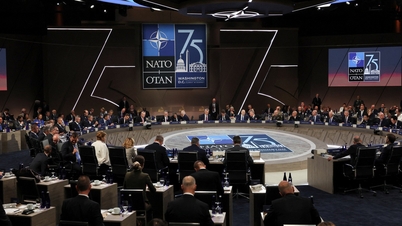





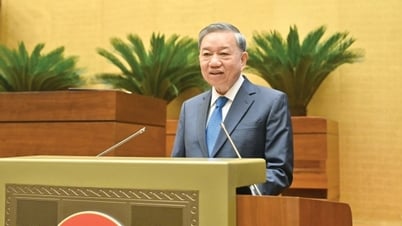
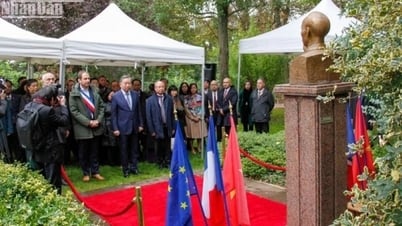
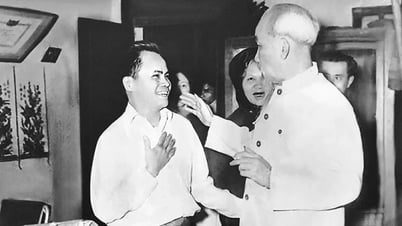































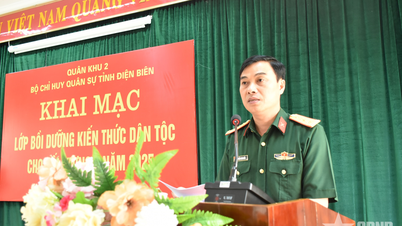





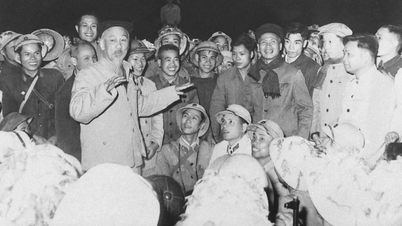














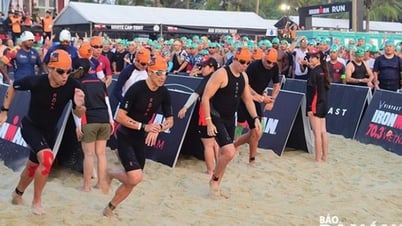
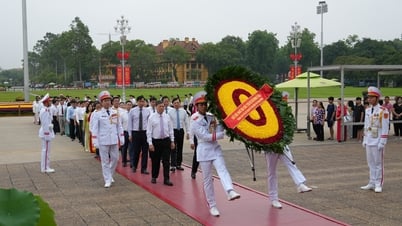











![[VIDEO] - Enhancing the value of Quang Nam OCOP products through trade connections](https://vphoto.vietnam.vn/thumb/402x226/vietnam/resource/IMAGE/2025/5/17/5be5b5fff1f14914986fad159097a677)







Comment (0)